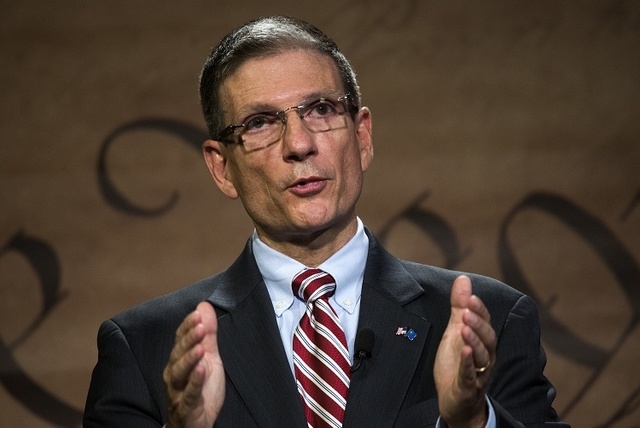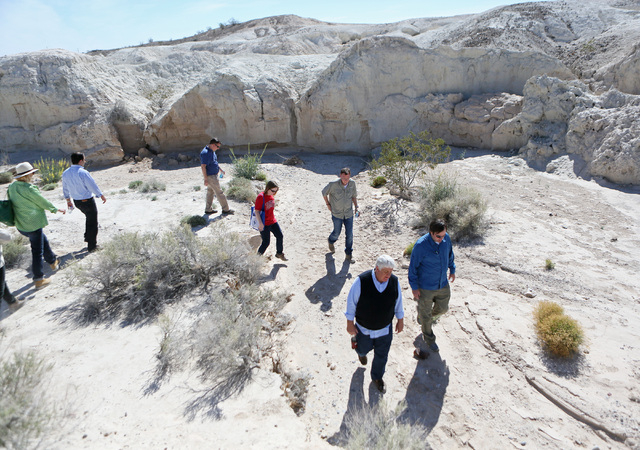Nevada bills on the line as Congress heads to finish
WASHINGTON — Jodi Goldberg has spent hours on Capitol Hill over the past two years, testifying before congressional committees and watching lawmakers debate a heartbreaking matter close to her family.
She is seeking passage of a bill that would force the National Park Service to grant waivers for search teams such as the one that was forced to wait nine months before being able to set foot on Lake Mead National Recreation Area to recover the remains of her slain brother, Keith Goldberg, a year ago.
The bill by Rep. Joe Heck, R-Nev., passed the House unanimously in January but still not the Senate. Goldberg, who lives in Alexandria, Va., said a Heck staffer sent her an email a few days ago saying there is a chance senators finally might act before they wrap up the year.
“It would be great if it got through by the end of the year,” Goldberg said this week. “What a great holiday gift for everyone.” If the bill somehow fails to get finished, “I think we’d be really disappointed.”
The Goldberg-sought bill, called the The Good Samaritan Search and Recovery Act, is not alone on the fence. With Congress stymied in partisan fights for most of this year, more than a dozen initiatives that affect Nevadans still are awaiting action, and time is running short.
When lawmakers return to work next week, fewer than 10 scheduled days will remain in the postelection lame-duck session. The House has set Dec. 12 as its target adjournment date, though that could change. The Senate has not yet set an end date.
The final days of a congressional session can get unpredictable as last-minute deals often are cut that advance bills or send them to their graves. Anything not passed by the end of the year must be reintroduced in the new Congress before it can be considered.
“I was in the Legislature for a long time, and I know the most important things don’t happen until the end. I’m not frustrated yet,” said Rep. Dina Titus, D-Nev., who was a state senator for a decade in Carson City. “You don’t give up until the fat lady sings.”
TAX DEDUCTION THE BIG ONE
The bill with the broadest impact would enable Nevadans to continue deducting state and local sales taxes from their federal taxable income. That tax break expired in December but could be made retroactive to allow filers to claim the deduction next April on what they’ve spent in 2014.
Congress failing to act means higher taxes in the spring for the 280,000 Nevadans who claim the deduction — 22 percent of taxpayers in the state, according to the Internal Revenue Service. Nevadans claimed an average deduction of $332 in 2012, according to Pew Charitable Trusts.
The sales tax deduction is among more than 50 targeted tax breaks, gathering in what is called a “tax extender” bill, that have expired or are about to expire, including others that benefit homeowners who are underwater on their mortgages.
“I think it’s going to pass,” Titus said of the tax extenders. “It’s just what’s going to be in there that’s the key.” Republicans have placed a priority on approving business-related tax breaks, and it was unclear what might become of others.
Senate Majority Leader Harry Reid, D-Nev., is among the negotiators on the tax bill. He reportedly was working on a deal to make the state sales tax deduction a permanent part of the tax code, which would avoid having to renew it every year or every two years.
But momentum for the bill was stalled this week when the White House threatened a veto on the grounds the proposed agreement overall tilted too far in favor of tax breaks for business.
Meanwhile, Las Vegas business leaders have traveled to Washington a half dozen times over the past two years to push their interests. The Las Vegas Metro Chamber of Commerce is dispatching executives to Capitol Hill one final time next week to lobby for late action on a handful of bills, including renewal of federal backup terrorism insurance that all the Nevada resorts carry, a tourism promotion bill and a bill that would give excess federal tracts to Las Vegas and North Las Vegas for economic development.
“These are important priorities for Southern Nevada and for our entire state,” said Cara Clarke, senior director of communications of the chamber. “We look at this as an opportunity to get some of these things passed. We want to do all we can to make that happen.”
BILLS OF INTEREST TO NEVADA
Heading into the home stretch, other Nevada bills on the fence would:
■ Designate prized fossil beds at Tule Springs in northern Clark County as a 22,650-acre national monument. The same package would grant 645 acres of federal land to North Las Vegas and 660 acres to the city of Las Vegas for development and expand conservation areas of Red Rock Canyon.
North Las Vegas Mayor John Lee and Las Vegas City Councilman Steve Ross traveled to Washington last week to sound out Nevada lawmakers on its chances for passage. Officials said there is no deal yet.
Rep. Steven Horsford, D-Nev., who was defeated this month and whose term ends at the end of the year, said he planned to spend his final days in office trying to get the bill passed.
Rep. Rob Bishop, R-Utah, who is in line to become chairman of the House Resources Committee in January, said last month there could be action on the Southern Nevada bill early next year if nothing happens during the lame duck.
■ Extend the tax break shielding underwater homeowners from taxes on portions of their mortgages that are forgiven or if they take a loss in a short sale.
■ Create 73,500 acres of wilderness in Lyon and Humboldt counties and redesignate other tracts of federal land in Lyon, Storey, Humboldt, Elko and Churchill counties for development. The centerpiece is a provision that would allow the city of Yerington to buy 10,000 acres to spur development surrounding the Pumpkin Hollow copper mine.
The Northern Nevada land bill has passed the House but not the Senate. Pumpkin Hollow workers have taken to growing beards on only part of their faces, a “half-beard challenge” to highlight that the job of passing the legislation is only half done.
■ Repeal the “handle tax” that sports books object paying to the IRS. Operators paid about $9 million last year.
■ Add 26,565 acres to the reservation of the Moapa Band of Paiutes outside Las Vegas, a personal pledge to the tribe from Reid.
■ Expand the reservations of tribes in Humboldt, Elko and Washoe counties, and the Pyramid Lake Paiutes whose reservation includes land in Washoe, Storey and Lyon counties.
■ Renew the “Brand USA” program that promotes international travel to Las Vegas and elsewhere in the United States. Cash and contributions from the U.S. travel industry is matched by up to $100 million in federal spending raised through visitor visa fees.
■ Broaden a $15 million tax deduction for movies and television productions to include theater shows as well. The tax break could benefit Cirque shows on the Strip and those that take place at The Smith Center for the Performing Acts.
■ Help the long-term unemployed by offering a $2,400 tax credit for businesses who hire people who have been out of a job for more than 26 weeks. The measure figures to be the only safety line offered to the long jobless after Congress failed to renew federal unemployment benefits that expired a year ago.
■ Extend tax credits for production of wind energy, sought by investors of renewable energy projects in Nevada and across the West.
OTHER ISSUES
Other decisions Congress makes in its final days could affect the state. For instance, a must-pass spending bill to keep the government running into 2015 could become a vehicle for a fight over resurrecting the Yucca Mountain nuclear waste project.
And while the to-do list is long, there are other Nevada bills acknowledged to be heading nowhere, at least this year.
One introduced in September by Reid would withdraw 805,000 acres from mineral exploration and development in Garden and Coal valleys in central Nevada.
A bill introduced by Heck to name a peak on Frenchman Mountain east of Las Vegas after the late President Ronald Reagan also stalled. The “Mount Reagan” bill passed the House Resources Committee in April but then disappeared from consideration as the state’s delegation split on it.
Las Vegas conservative activist Chuck Muth, who has led the campaign to name the peak for Reagan, said this week the bill was put on the back burner after Titus and Reid made clear they would fight against it.
“Strategically the decision was let’s wait until after the election and see if we get a Senate that is going to be more open to passing it in the next Congress,” Muth said.
With Republicans gaining the Senate majority, “we may well have gotten that,” Muth said.
Contact Stephens Washington Bureau Chief Steve Tetreault at stetreault@stephensmedia.com or 202-783-1760. Find him on Twitter: @STetreaultDC.





























